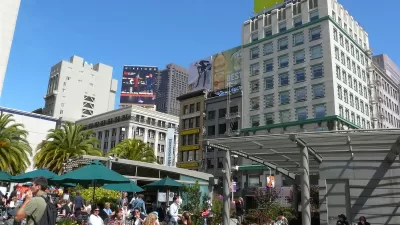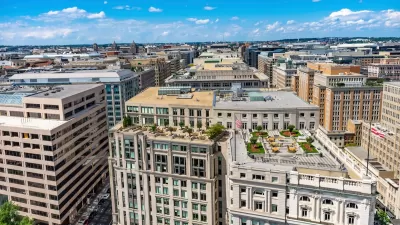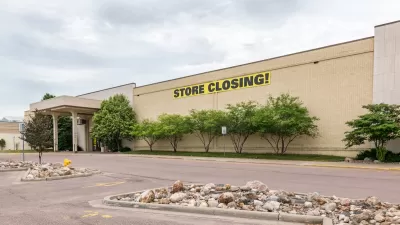To its minimal credit, Borders Books & Music always had a a few shelves where the works of Jacobs, Mumford, Kunstler, Whyte, Florida, and others resided. But, judging by the financial and aesthetic bankruptcies of, respectively, Borders and many American cities, it seems that copies of Life and Death (or anything else) weren't exactly flying out the door. If the public's understanding of urban economies even began to rival its fascination for gossip, self-help, and vampires, Borders never would have arisen in the first place.
To its minimal
credit, Borders Books & Music always had a a few shelves where the works of
Jacobs, Mumford, Kunstler, Whyte, Florida, and others resided.
But, judging by the
financial and aesthetic bankruptcies of, respectively, Borders and many American cities,
it seems that copies of Life and Death (or anything else) weren't exactly flying out the door. If
the public's understanding of urban economies even began to rival its
fascination for gossip, self-help, and vampires, Borders never would have
arisen in the first place. And this week its creditors wouldn't have had to put a
stake through its heart.
I, for one, am
glad to see it go.
On the one hand,
America inches ever more towards illiteracy. Borders stores, while far from
cozy, were pleasant and reasonably stimulating, relative to, say, big boxes and
supermax prisons. For countless thousands of bibliophiles and starving students
who found their first jobs there, Borders sure beat McDonald's. I should know.
One of my first jobs was at Barnes & Noble (same difference).
What I found
working my (short) stint at B&N -- and I'm sure that Borders was much the
same -- is that the mega bookstores treat books like any other commodity.
Borders stores are sterile, corporate places where art, ideas, and information
rot on the shelf. As I once noted in a Planetizen book review of Stacy Mitchell's Big Box
Swindle, the big bookstores share far more in common with Walmart and Best Buy
than they do with the independent stores that populate Main Street. Or that
used to.
Along with the
other mega-retailers who benefited from perverse incentives in planning,
zoning, and tax laws, Borders assisted in the gutting of American retail
streets and the decimation of a proud entrepreneurial and intellectual
tradition. In my hometown, I have already shed enough tears for Dutton's,
Wilshire Books, and others. I, unlike Borders' fans, am all tapped out.
But I'm hopeful
about what could arise after the demise of Big Book.
The U.S.
government bailed out the auto and finance industries because, so the argument
goes, the economy depended on them. But that's only half the reason. The other
half is that those industries have incredibly high barriers to entry. If you
want cars and banks, you have to stick with the ones you have. You
can't design and build cars or a banking system overnight.
You can,
however, set up a bookstore in pretty short order. (In downtown L.A. one opened
up from nothing a few weeks ago.)
I want to
believe, as Jacobs' famous title implies, that the pendulum can swing back. In fact, the conditions could not be
better for a revival of independent retail.
Borders, which is closing its last 399 stores,
collapsed because it had too few customers to support hundreds of enormous
stores. But that doesn't mean that there aren't enough customers to support
smaller stores in equal, or even greater, numbers. For a little while, in cities where Borders already drove out all the independents, those customers will be out of luck. But then they should start raising hell. Perhaps a few of them will even found stores of their own.
The next wave of
startup bookstores will face competition from neither Borders nor other
independents. The same
recession that has depressed consumer spending has also depressed commercial
rental rates. Vacant storefonts in Main Streets and in strip malls alike are
there for the asking. You could probably buy a truckload of gently used books
for what it costs to air condition a single Borders for a month. These new
stores will, I suspect, instantly gain the loyalty -- and money -- of legions
of customers who formerly thought that Borders was the ne plus ultra of
retail.
They will quickly learn the error of their ways.
They will also
make cities better. People on the extremes, who are both cynical of and
rapturous about the free market, forget that some forms of commerce have
intrinsic social benefits. Payday advance places and Hot Topic, for example,
probably do not. But bookstores do. They are lively places, ideally
with something for everyone. They bring people together and give them
something to talk about. They foster the exchange of ideas that make cities
great, and wealthy, in the first place. And, when they are independent and local, they create a multiplier effect.
Cities with half
a brain will throw out the tiresome manual that says that economic development
depends on factories and infrastructure. They should, instead, seize this
moment and promote entrepreneurship. A bookstore-centric economic development plan probably makes little sense. But just as cities have lured big boxes for all the wrong reasons, they can probably figure out ways to make their storefronts and urban neighborhoods more inviting to entrepreneurs.
Most antiques
don't get a second chance. Sure, some folks still ride horses, and fewer still
take the hotrod out on Saturday night. The market for ironic vintage
fashion is bigger than ever. But the demise of Borders does not mean that books
have become antiques. Books have survived for 600 years, and bookstores are not much younger. As a human innovation,
they are bested only by cities themselves.
The bookstore is
dead. Long live the bookstore.

Maui's Vacation Rental Debate Turns Ugly
Verbal attacks, misinformation campaigns and fistfights plague a high-stakes debate to convert thousands of vacation rentals into long-term housing.

Planetizen Federal Action Tracker
A weekly monitor of how Trump’s orders and actions are impacting planners and planning in America.

In Urban Planning, AI Prompting Could be the New Design Thinking
Creativity has long been key to great urban design. What if we see AI as our new creative partner?

King County Supportive Housing Program Offers Hope for Unhoused Residents
The county is taking a ‘Housing First’ approach that prioritizes getting people into housing, then offering wraparound supportive services.

Researchers Use AI to Get Clearer Picture of US Housing
Analysts are using artificial intelligence to supercharge their research by allowing them to comb through data faster. Though these AI tools can be error prone, they save time and housing researchers are optimistic about the future.

Making Shared Micromobility More Inclusive
Cities and shared mobility system operators can do more to include people with disabilities in planning and operations, per a new report.
Urban Design for Planners 1: Software Tools
This six-course series explores essential urban design concepts using open source software and equips planners with the tools they need to participate fully in the urban design process.
Planning for Universal Design
Learn the tools for implementing Universal Design in planning regulations.
planning NEXT
Appalachian Highlands Housing Partners
Mpact (founded as Rail~Volution)
City of Camden Redevelopment Agency
City of Astoria
City of Portland
City of Laramie






























